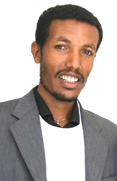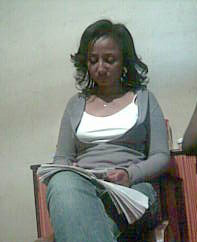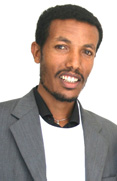At the end of June, Ethiopia’s Anti-Terror Task Force arrested nine people on charges of attempting to “destroy electrical and telecommunication infrastructures” with support from Ethiopia’s arch-enemy, Eritrea. Held under Ethiopia’s far-reaching antiterrorism law, only four of the suspects’ names have so far been revealed and two of them happen to be journalists.

Dawit Kebede, managing editor of the independent weekly Awramba Times and a 2010 CPJ International Press Freedom Award winner, said he was stunned by the news. His longtime university friend and colleague, Awramba Times Deputy Editor Woubshet Taye is one of the suspects. “I have never been so surprised in my life and the same applies to the rest of our staff,” Kebede told me. He called Woubshet “a stickler for the rule of law. I cannot think of a less likely terrorist.”
Temesgen Desalegn, editor of another independent weekly, Feteh (meaning “Justice”), was also shocked to discover his columnist, Reeyot Alemu, was arrested for terrorism. “Yes Reeyot was a critical writer but a terrorist? You could never read anything in her articles that would convey any antistate tendencies,” Desalegn told me.
Kebede has known his friend and colleague Woubshet Taye for 11 years since their days studying journalism together at Unity University in the capital, Addis Ababa. Kebede and Taye started working together in 2004, as Taye became a senior reporter for the now-defunct private weekly, Hadar. Taye, like Kebede, has had his share of run-ins with Ethiopian authorities. Both were arrested during the government crackdown on the independent press following the disputed 2005 elections. An avid reader, Taye donated 200 books to Awramba Times when the publication was launched in 2008. But he almost resigned from Awramba Times during the May 2010 elections after the director of the state broadcasting authority accused him of inciting and misguiding the public. Taye and Kebede had written a piece a week earlier that raised questions about the lack of public enthusiasm for the May 2010 elections, which the ruling party swept.

Alemu, 28, has worked primarily as a high school English teacher. For a short time, she served as editor of a private weekly, Addis Press, before the paper dissolved several months ago, said Desalegn, who recruited her to write a political column for Feteh. Even while working long hours as a journalist, he said, Alemu continued to teach. Just before her arrest, she was planning to marry and start a family. Her students and colleagues are in disbelief over the charges, Desalegn added.
Both Kebede and Desalegn fear the government is bringing the terrorism charges as a way to silence their publications. Knowing that a direct closure of either publication would lead to both local and international condemnation, “the arrest of Reeyot works as a warning light for us to censor our reporting,” Desalegn said.
Both publications have faced intimidation from authorities and been targeted in smear campaigns by pro-government and government-controlled state media. Since Feteh started in 2008, authorities have questioned Desalegn twice and filed a staggering 41 lawsuits against him. Desalegn and Kebede have decided to continue publishing as best they can under the circumstances.
Beyond vague public accusations, the Ethiopian government has yet to present any evidence against Taye and Alemu. The journalists are expected to remain in jail for at least another month after a magistrate this week granted prosecutors an extension of 28 days to pursue “investigations,” according to local journalists.
